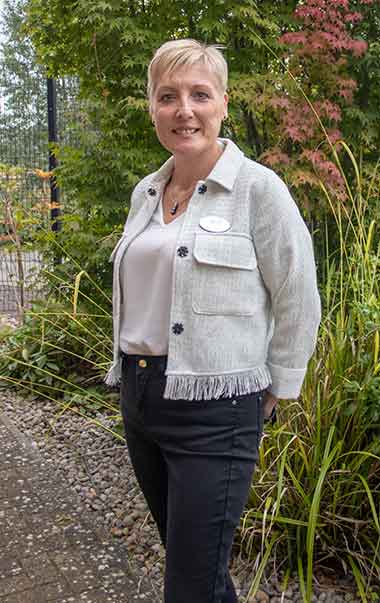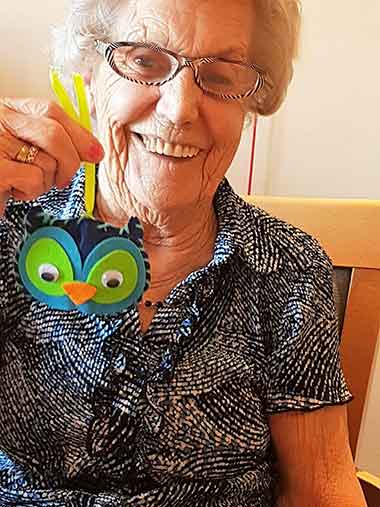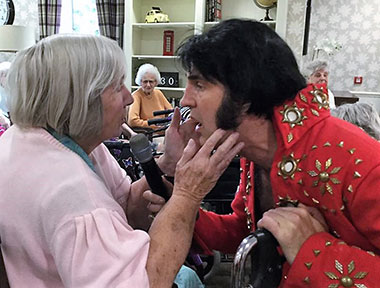ReConnect is our all Encompassing Dementia Care Approach
Engagment Through Our ReConnect Dementia Care Services
At Avery Healthcare, we provide a range of care services for people with dementia. The broad spectrum of care and support needs posses quite a challenge and requires that we approach each resident in a way that addresses that persons unique requirements. Residents with mild cognitive impairment are encouraged to spend time with our residents on our residential suites, while our residential dementia care suites provide more focused support for residents who need extra help from staff with additional skills and qualifications.
We focus heavily on non-pharmacological interventions wherever possible, by understanding the life story of each of our residents to appreciate the person and how their life experiences may influence the here and now. We work carefully and confidently to balance positive risk taking against unnecessary restriction. Our meal times bring comfort and joy and we have started to trial tasty finger food that can be eaten easily without the need for cutlery. Read more about how we deliver a culinary experience to our residents living with dementia.
Our staff are empowered to develop meaningful relationships with our residents and their families so that we can work as partners in caring for our residents. . We are practitioners of care and trusted team members, in supporting residents whether we are carers, nurses, managers, chefs, maintenance or reception staff.
We understand that if someone is distressed, there is a reason, even if they are unable to define it to us, and we have creative tools through ReConnect to support them. All of our residents, families and staff make us better at what we do, by working with us and being a part of our organisation.
Please contact your nearest care home so that we can listen to your needs and let you know how we can support you.
Our Life Story Work
Life Story Work is a central part of our ReConnect strategy. It is often used in memory care settings as a useful way of helping others to understand more about a person. Knowing something of the life story of a resident can help members of the team to engage with an individual in a meaningful and interesting way. Understanding the previous interests, hobbies and routines of a resident helps our teams to maintain opportunities for positive engagement.
By understanding the difficulties that an individual with increasing cognitive impairment may experience, our teams can adapt activities to be failure-free reducing the risk of distress to a resident. Examples of activities in our homes; music including Choirs, Playlist for Life and Music Clubs; regular outdoor trips; memory boxes and life story boards to support individual and small group reminiscence.
Life Story Work can also help the care team and family members to make sense of the way a person acts and reacts in situations, allowing the right level of support to be given. The care team can provide more detailed information on how life story work is used and how it helps with planning care for a person with dementia, as well as helping others to connect with the person.
Watch Our Life Story VideoPlaylist for Life – a musical intervention
We are all familiar with the power of music to move us and help us reflect on past times. For those living with a cognitive impairment the same is true. We have used music as a vehicle to involve family and carers in exploring memories of the past with loved ones, creating playlists that take both family and residents on a journey, reflecting on shared experiences either verbally or non-verbally. We are currently exploring the potential of personal digital assistants in devising playlists for residents who have limited or no mobility. We have found that music is a valuable touchstone with the past and a great way of bringing carers, residents and their families closer together.
Watch Our Music Therapy VideoI grew up in a little village in the Yorkshire Dales and all I ever wanted to do was look after older people. I was fascinated by the lives they had led, and their huge life experience. I went to work in the care home in the village as a fifteen-year-old, and spent three years there before going on to begin my nurse training, always with the intention of working with older people.
It is thirty years now since I qualified as a nurse, and throughout that time, all I have ever done is work with older people, particularly people with dementia. Not long after I qualified as a nurse, dementia affected my family when my grandad was diagnosed with both vascular dementia and Alzheimer’s Disease. My Nana in particular found it very difficult to understand the changes that were happening to this wonderful man who she had been married to for almost 50 years.
It is twenty-six years since my Grandad passed away but I have never forgotten how difficult and painful it was for our family. That experience has guided and influenced my career and drawn me deeper into my lifelong research and learning about dementia.
I completed additional training to become a mental health nurse, before completing a BSc (hons) in Dementia Studies and a MSc in Dementia Care (Dementia Care Mapping). I am currently studying for a part-time PhD at Leeds Beckett University to develop a family support intervention for use by staff working in our homes.
Developing the Avery ReConnect Strategy and approach to dementia care at Avery is the culmination of 30 years of working in the field of dementia care and draws on the most contemporary and robust evidence-based research to provide a practical and accessible resource for every member of staff working in our homes.
Through ReConnect, excellent dementia care becomes not only a possibility, but a reality. ReConnect supports our staff with training opportunities and practical resources to make sure that residents with dementia and their families can to continue to enjoy a fulfilling and positive life.



